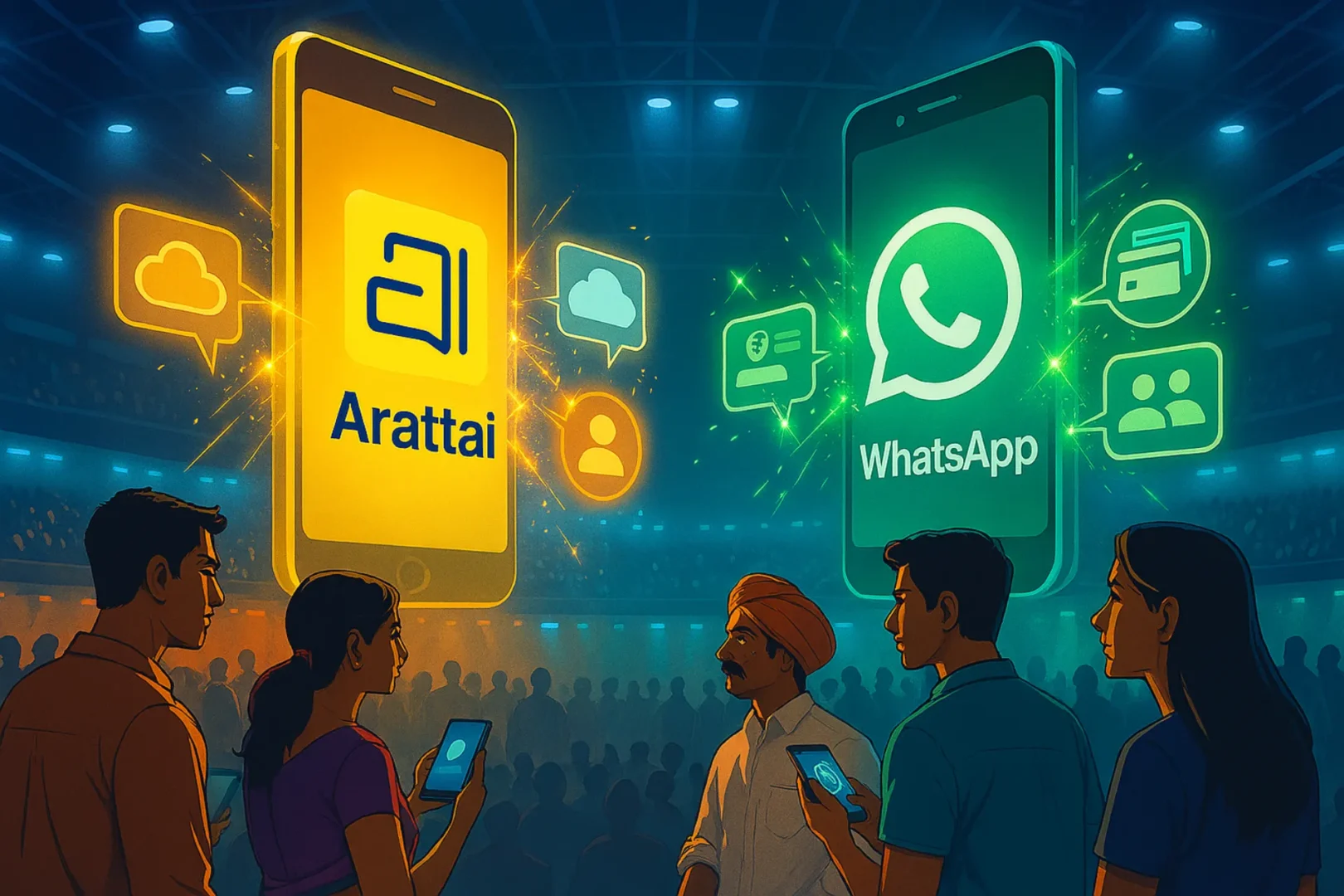NEW DELHI, India — The Indian-developed messaging application Arattai, created by the technology company Zoho, has recently become a viral sensation within the country, raising questions about its potential to compete with the market behemoth, Meta’s WhatsApp.
Zoho reported a massive surge in adoption, claiming seven million downloads in “seven days last week,” although specific dates were not provided. This rapid ascent is notable given that market intelligence firm Sensor Tower had recorded less than 10,000 downloads for Arattai in August.
Arattai, which means “banter” in the Tamil language, had a quiet soft launch in 2021. Its recent explosion in popularity is strongly linked to the federal government’s “Make in India” and “Spend in India” initiatives, promoted by Prime Minister Narendra Modi and his ministers as a response to the impact of steep US trade tariffs.
Federal minister Dharmendra Pradhan fueled the wave when he posted about Arattai on X a fortnight ago, urging people to use “India-made apps [to stay] connected.” This official endorsement was quickly followed by posts from other ministers and business leaders.
Zoho confirmed the government’s influence, stating that the push “definitely contributed to the sudden surge in Arattai downloads.”
“In just three days, we saw daily sign-ups increase from 3,000 to 350,000. In terms of our user base’s active users, we saw a 100X jump, and that number is continuing to rise,” Zoho CEO Mani Vembu told Vivid Voice News. He added that this success indicates that users are “enthusiastic about a homegrown product that can meet all their unique needs and requirements.”
Market challenges and feature parity
Despite the initial viral success, experts suggest Arattai’s active user base is still a long way from challenging WhatsApp’s estimated 500 million monthly active users in India.
WhatsApp is deeply integrated into Indian life, used for everything from social communication to running businesses. Sensor Tower reports that over 95% of Arattai’s monthly active users in September were located in India.
Arattai offers feature parity with its rival, allowing users to send messages and make voice and video calls, alongside a set of business tools.
The app, like WhatsApp, claims to operate smoothly on low-end phones and slower internet speeds.
Many users on social media have praised its interface, design, and usability, noting a sense of pride in using an Indian-made product.
However, past attempts by Indian apps, such as Koo (a rival to X) and Moj (a rival to TikTok), have failed to sustain their initial success.
Delhi-based technology analyst Prasanto K Roy points out the difficulty in breaking WhatsApp’s extensive network effect, especially since the platform hosts numerous businesses and government services.
Roy argues that Arattai’s long-term success will hinge on its ability to retain users, which he believes “cannot be driven by nationalist sentiment alone.” He concludes: “The product has to be good, but even then, it’s unlikely that it will be able to replace an app that has billions of existing users in the world.”
Privacy concerns and government oversight
A significant concern raised by experts revolves around data privacy. While Arattai currently offers end-to-end encryption (E2EE) for voice and video calls, it does not yet offer this feature for text messages.
Shashidhar KJ, managing editor at MediaNama, noted the potential trade-off: “The government wants to establish traceability of messages citing security concerns and this can be done easily without end-to-end encryption,” adding that this practice “puts people’s privacy at risk.”
Zoho’s CEO acknowledged the issue, stating the company is actively working to roll out E2EE for text messages. “We had initially planned to launch this app after E2EE, which would have happened in a couple of months,” Mani Vembu said. “However, the timelines have been pushed up, and we are trying to bring some critical features and infrastructure support as quickly as possible.”
WhatsApp provides E2EE for both messages and calls but, under its policy, can share metadata with governments under legally valid circumstances. India’s internet laws require social media platforms to share user data in certain situations, but obtaining this from international giants like Meta can be time-consuming and met with legal resistance.
Also Read: WhatsApp to introduce usernames, allowing chat without phone numbers
Technology law specialist Rahul Matthan suggests that many people will remain uncomfortable using Arattai until there is greater clarity on its privacy architecture and Zoho’s willingness to resist government requests to share user-generated content.
Roy added that it is possible for Zoho to feel beholden to the government, especially given the official publicizing of the app, making it difficult for an Indian startup to strongly resist local laws.
When questioned on the issue, Mani Vembu maintained that the company “wants its users to retain full control over their data while complying with the country’s information technology rules and regulations.”
He pledged transparency: “Once full end-to-end encryption is rolled out, even we won’t have access to the content of user conversations. We will be transparent with our users about any legal obligations.”
The ultimate question remains whether Arattai can overcome the historical pattern of homegrown apps failing to dislodge entrenched global giants, or if it will be another fleeting success driven by nationalist sentiment.

